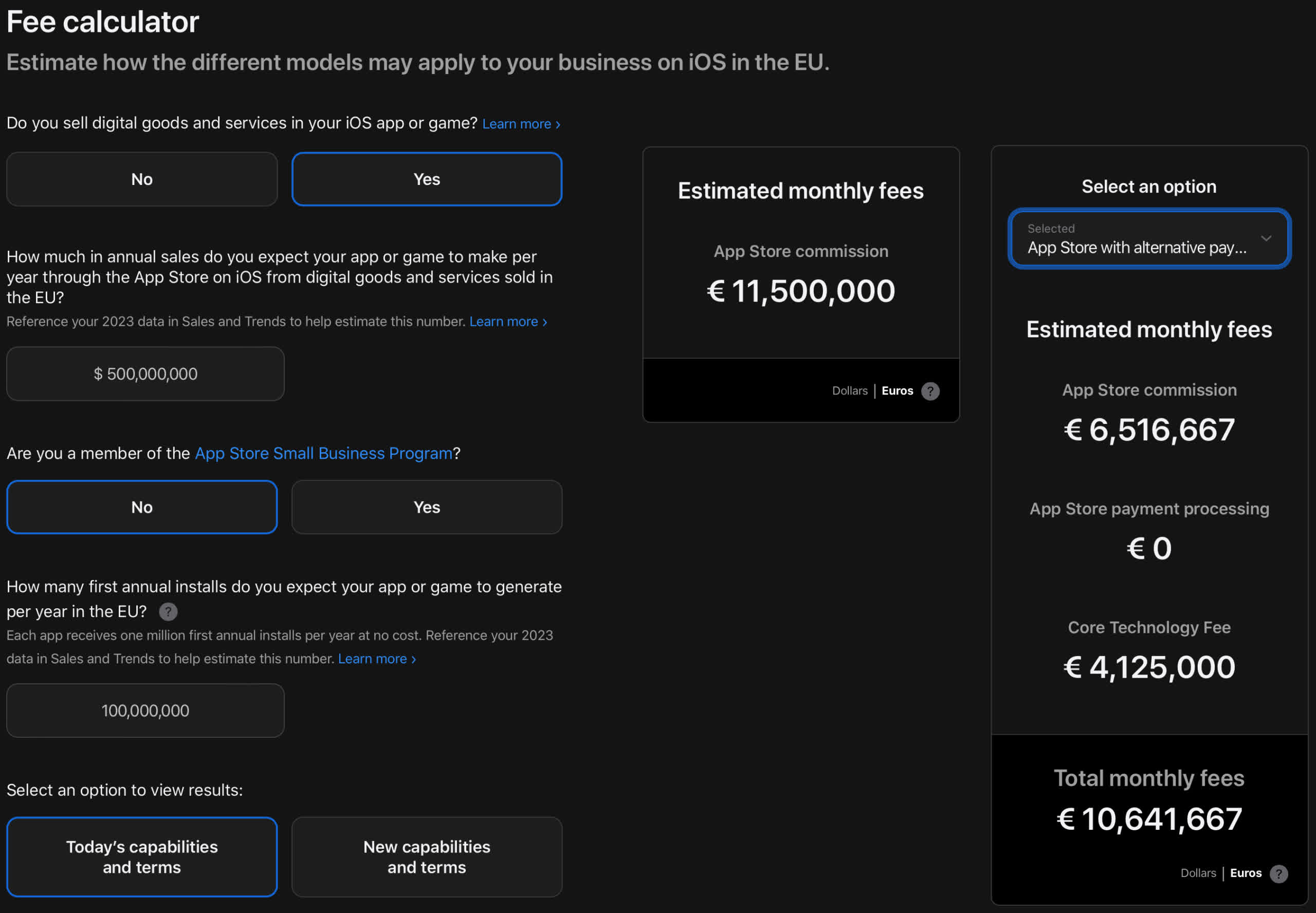Serving the tech enthusiast community for over 25 years.
TechSpot means tech analysis and advice you can trust. Read our ethics statement.
A hot potato: The EU’s new Digital Markets Act (DMA) is forcing Apple to change how it conducts its app business. The law intends to open Apple’s European ecosystem for sideloading and alternative payment methods. More importantly, it allows developers to create and release independent marketplaces for iOS, but not without a cost.
Under Apple’s newly published rules, some developers could see their 30-percent App Store fee shrink or disappear altogether. If an app maker decides to distribute through a third-party marketplace, they can avoid the so-called Apple tax, as long as they have less than a million installs.
For example, a small developer with 900,000 EU downloads and making $5 million per year pays Apple nothing when using an alternative app store and payment method. Furthermore, it could use the alternative store in conjunction with the App Store at a 10-17 (normally 30) percent reduced fee if it wanted to widen its distribution channel.
So why do developers like Epic Games and Spotify call the new rules “hot garbage” and “extortion?”
According to the App Store’s DMA restructuring, developers that have apps with over a million installs must pay a €0.50 ($0.54 US) Core Technology Fee (CTF) on every download over that first million. Additionally, downloads include app updates. So, if a user has an old, unused app that receives automatic updates, the developer is still on the hook for that CTF. Optionally, developers can agree to remain under the App Store’s current provisions.
Apple’s plan to thwart Europe’s new Digital Markets Act law is a devious new instance of Malicious Compliance.
They are forcing developers to choose between App Store exclusivity and the store terms, which will be illegal under DMA, or accept a new also-illegal anticompetitive…
– Tim Sweeney (@TimSweeneyEpic) January 25, 2024
Developers are crying foul, saying the rules are anticompetitive and even illegal. Epic CEO Tim Sweeney called the CTF “Junk Fees.”
“They are forcing developers to choose between App Store exclusivity and the store terms, which will be illegal under DMA, or accept a new also-illegal anticompetitive scheme rife with new Junk Fees on downloads and new Apple taxes on payments they don’t process,” Sweeney tweeted.
In a lengthy blog post, Spotify CEO Daniel Ek calls Apple’s proposition “untenable” and says his company cannot afford the CTF, so it must stay in the walled garden.
“Spotify, like so many other developers, now faces an untenable situation. Under the new terms, if we stay in the App Store and want to offer our own in-app payment, we will pay a 17% commission and a 0.50 cent Euro Core Technology Fee per install and year. We cannot afford these fees if we want to be a profitable company, so our only option is to stick with the status quo. The very thing we’ve been fighting against for five years. This is extortion, plain and simple.”
But are Sweeney and Ek being genuine, or is it that they feel they should pay Apple nothing, period? We were curious to see the bottom line for large companies, and it doesn’t appear that the CTF will hurt them when contrasted with the current status quo.

Let’s use Spotify as an example. In 2022, Spotify reported $9.668 billion in revenue. It also has a user base of 574 million users worldwide. However, the rules only apply to the EU market. Ek mentioned in his complaint that Spotify has about 100 million EU users, or about one-fifth of its user base. Assuming revenue in Europe is proportional, that would mean that it sees about a billion dollars from EU subscribers, but Apple caps revenue at $500 million.
Plugging these numbers into Apple’s Fee Calculator reveals that if Spotify ditched Apple’s payment processor, it would owe €127.2 million annually ($139.2 million) for the CTF fee, plus whatever it costs to run its payment system. This figure is less than the €138 million annually ($150 million) in App Store processing fees the company currently faces. It could bring costs down to about $4 million were it to also distribute through an independent app store.
Ek is disingenuous in saying the company must stay with the status quo because it “can’t afford” the CTF model because Spotify would owe €11 million less per year under the new system than it pays now.
Of course, not all apps are created equal. The CTF could harm smaller developers who offer highly popular free apps unless they have a solid monetization strategy. Meanwhile, apps with user bases below one million stand to benefit the most.
It’s finally happening — sideloading is coming to the EU!
We’ve started the process of becoming a legitimate “app marketplace”, allowing our European friends to download Delta and other AltStore apps officially for the first time ever!
See you in March âÂÂï¸Â pic.twitter.com/fIZOV0GtXj
– AltStore.io (@altstoreio) January 25, 2024
Another issue of contention is Apple requiring a €1,000,000 letter of credit from an “A-rated” financial institution to create an alternative EU app store. However, some players are okay with that requirement.
Riley Testut already has plans to launch his “AltStore” in March when the DMA goes into effect.
“As a whole, I view this as positive for the platform,” Testut told The Verge. “While [a €1,000,000 letter of credit] does significantly raise the barrier for entry, I’ve learned first-hand that running an alternative marketplace comes with a strong responsibility to protect users. By requiring proof of credit, this ensures marketplaces are at least legitimate businesses, reducing the risk of ‘scam’ marketplaces taking everyone’s money and leaving.”
It doesn’t matter what companies and developers think about the proposed restructuring. Apple’s legal team has undoubtedly weighed in to ensure it complies with the DMA. However, the European Commission will have the final say when it reviews the plan in March.
